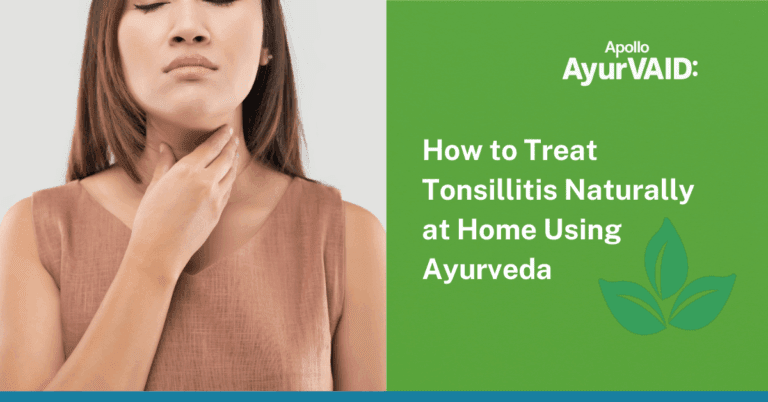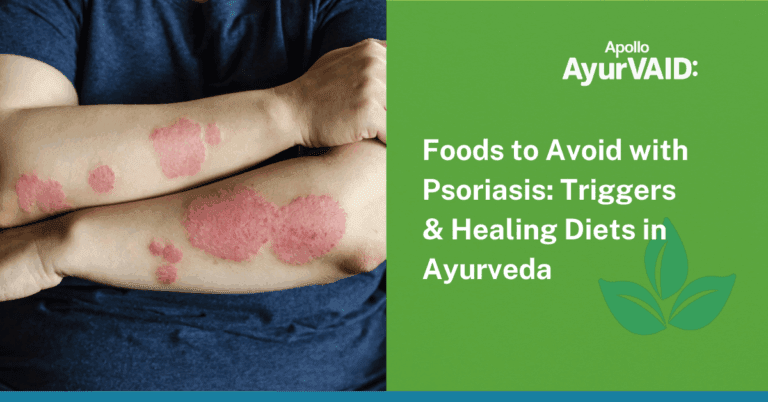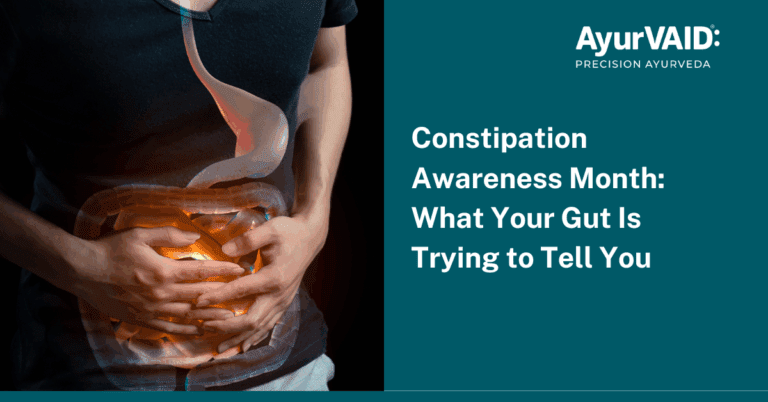Introduction
Human metapneumovirus (hMPV) is a respiratory virus in the family Paramyxoviridae that causes upper respiratory infections, with diseases ranging from mild to severe. This condition is the most common globally; almost everyone is infected by age 5. It is responsible for 5-10% of respiratory infections in hospitalized children and can be infectious for life.
According to Ayurveda, ailments concerning the respiratory system are often caused by an imbalance in the doshas (especially Kapha and Vata), weakened Agni or digestion, and lower immunity. Ayurveda treatment for hMPV thus aims at understanding the impairment of the Doshas, Dosha-Dooshya Sammurchana (Pathophysiological Interaction), and the resultant Sroto Vaigunya. Correcting the same with appropriate medicines, therapies wherever required, and diet and lifestyle modifications that enhance the body’s natural defenses against the condition is the main aim of the treatment. This blog delves into hMPV symptoms, and how they can be treated using the principles of Ayurveda, nurturing the respiratory system, and enhancing immunity.
Symptoms of Human Metapneumovirus
hMPV-infected individuals typically experience cold or flu-like symptoms like cough, fever, sore throat, runny nose, body ache, and headache. Severe symptoms may include pneumonia, bronchiolitis, bronchitis, and persistent fever, requiring medical advice for severe cases.
Ayurveda identifies symptoms like cough, fever, sore throat, body ache, and headache as manifestations of imbalances in three doshas leading to Jwara. These symptoms are often observed in conditions like Agantu Jwara (fever), Kasa (cough), Pratishyaya (common cold), and Tamaka Shwasa (Asthma or COPD). Pneumonia manifested in the later stage can be considered Vatolbana in Sannipata Jwara (Fever manifested due to three doshas with the predominant symptom of Vata derangement).

Causes and Transmission
It is caused by droplet infection by a virus that replicates by using the host’s cells. It is part of the same group as viruses causing sickness like RSV, measles, and mumps. This virus spreads when someone touches or is near an infected person or things touched by them. Ayurveda doesn’t directly discuss viruses in writings but mentions symptoms tied to viral sicknesses. These are linked to dosha imbalances, low Ojas (energy or immune strength), and Ama (toxins). Viruses could fit under Krimi (tiny life forms or harmful entities), that disrupt the body’s harmony due to external factors leading to internal dosha imbalances.
Risk Factors and Complications
Groups of people who may also be more likely to have complications from hMPV are children younger than 5 years.; adults older than 66; people with weakened immune systems; or people with other conditions, such as asthma or COPD.
Ayurveda considers these risk factors of falling sick as an imbalance of doshas (Vata, Pitta, and Kapha), weak Agni (digestive fire), low Ojas (immunity), and an increase of Ama (toxins). These imbalances can arise from various internal and external factors. Below are the key risk factors for falling sick as per Ayurveda:
- Fluctuating energy and resilience can make Vata predominant people prone to sudden external influences.
- Agni mandya (weak or irregular digestion) leads to the accumulation of ama (toxins), which reduces the body’s ability to ward off pathogens.
- People with a disturbed structural and functional organization of Dhaatu such as those obese, very lean, and asthenic, those who indulge in diets incompatible with their body structure, those who eat very little, those who are psychologically labile and prone to stress are unable to resist disease or becomes diseased easily.
- Since children’s bodies are still developing, their Ojas are in a state of formation. As a result, they are more vulnerable to imbalances and thus at risk for developing diseases.
- As individuals age, their Ojas naturally deplete causing increased susceptibility to diseases.
Prevention
Masks, ventilation, and hand cleaning are the fundamental preventive measures. A good immune system, diet, exercise, and proper sleep can help fight infection.
Preventive measures include wearing masks, improving ventilation, and cleaning hands. A strong immune system, a balanced diet, exercise, and proper sleep can help fight infections.
Ayurveda focuses on preventing communicable diseases through primary prevention, secondary prevention, and personal hygiene practices.
- A healthy lifestyle is maintained by daily and seasonal regimens, good conduct, and proper (moral practice) action corresponding to primary prevention.
- Secondary prevention includes avoiding the causative factors and using therapies such as Santarpana (Nourishing Therapy) in the post-viral attack stage.
- Regular bathing, washing hands, feet, and mouth before meals, covering the nose/mouth during defecation, or keeping away from used clothes are the main prevention methods.
- Social distancing measures i.e. avoiding infected persons, prasanga (mutual contact), and sharing space.
- Immunity enhancement involves using Rasayana and Panchakarma procedures with specific herbs. Environmental measures include purifying the atmosphere and maintaining sanitation.
Ayurveda emphasizes strengthening host immunity, breaking disease transmission chains, and maintaining physical and mental health balance.

Diagnosis
A polymerase chain reaction (PCR) test is the most reliable way to diagnose hMPV, giving accurate results within a few hours. However, doctors may not suggest this test for people with cold or flu-like symptoms as there is no specific treatment for hMPV infection, and in most cases, it causes mild disease.
Differentiating between respiratory illnesses and hMPV is crucial, especially for severe cases like COVID-19 and influenza. Accurate diagnosis is essential to rule out other respiratory infections.
Metapneumovirus Treatment
Right now, there is no medicine approved for hMPV that fights viruses. Most people recover in a couple of days. People at higher risk should check with their healthcare provider even if their illness isn’t serious.
The Ayurveda treatment for hMPV starts with preventive measures, aimed at fixing imbalanced three doshas, predominantly Vata and Kapha, that impact the Rasavaha Srotas (plasma pathway) and Pranavaha Srotas (breathing pathway). The goal is to balance these doshas, boost immunity, and ease symptoms. Analysing the condition based on Ayurveda principles, and administering medications for fever and respiratory symptoms are important. Avoid fried, junk, and highly processed food, Keep yourself hydrated, and avoid too much screen time or staying up late thus taking adequate rest. Symptom relief occurs within 1-10 days, while tiredness takes up to 21-30 days to resolve. The Ayurveda interventions for managing mild to moderate viral pneumonia are efficacious with improved immunity, body strength, and quality of life. If the patient develops pneumonia, has low oxygen saturation levels, and has other pre-existing conditions, seeking contemporary treatment may be necessary.
Apollo AyurVAID Approach
Apollo AyurVAID provides complete human Metapneumovirus (hMPV) prevention and care. We provide evidence-based therapies to combat the illness. The treatment is comprehensive, with a focus on correcting the Srotovaigunya (Tissue-level transport abnormalities) and establishing the normalcy of Dosha-Dhatu-Mala (Regulatory-Structural-Excretory Framework). Rasayana Therapies to boost immunity, medicated fumigations to purify the air, Nasya Therapy to prevent the entry of pathogens, balancing three doshas with the help of internal medication, and avoiding humid environments are all part of our protocol.
Post-hMPV infection, we restore Agni (metabolism) and strength by addressing Ama Lakshanas (tissue inflammatory signs), using internal medicines to reduce inflammation and improve lung function. Our treatment aims at preventing recurrence by incorporating lifestyle adjustments like regular pranayama, seasonal detox therapies like Panchakarma, and a Kapha-Vata pacifying diet, avoiding cold and heavy foods.
The Precision Ayurveda approach is adopted by assigning treatment based on Prakriti and the current illness, and early treatment combining different preventive measures for a full recovery. Manage your life with these transformative approaches and take full control of your health in every respect.
Prognosis
hMPV typically has a good prognosis, with most people recovering within a few days to a week. However, it can lead to severe disease in certain people, especially those with weakened immune systems and other health conditions. Many patients with mild cases can be cured from home. Individuals with severe cases may need to be hospitalized and get intensive care.
Conclusion
hMPV is viewed by Ayurveda as a result of dosha disturbances, depletion of Ojas, and lack of strength of Agni. The comprehensive approach involves the primary levels of managing the patient through Dinacharya and Rtucharya, the second level is for specific therapy like rasayana and even Panchakarma procedures for boosting the immunity of the said patient, and finally, the three-tiered approach is completed by avoiding any hMPV instance via using Santarpana as secondary prevention. Furthermore, the approach recommends lifestyle changes and suitable diet plans alongside boosting mental health which makes it multi-functional.
References
- https://www.who.int/news-room/questions-and-answers/item/human-metapneumovirus-(hmpv)-infection
- Gupta A. Ojas and Vyadhikshamatava- Ayurvedic Perspectives of Immunity and its modulation in Clinical Arena. Nat Ayurvedic Med 2024, 8(3): 000451.
- Sharma H, Chandola HM, Singh G, Basisht G. Utilization of Ayurveda in health care: an approach for prevention, health promotion, and treatment of disease. Part 1–Ayurveda, the science of life. J Altern Complement Med. 2007 Nov;13(9):1011-9. doi: 10.1089/acm.2007.7017-A. PMID: 18047449.
- Dubey SK, Dubey RK, Tripathi YB, Dadhich NK. Preventive Measures for Communicable Diseases in Ayurveda and Ancient Indian Culture. Ann Ayurvedic Med. 2020;9(2):130-137.
- Nandhini G, Sujatha S, Jain N, Dhodapkar R, Tamilarasu K, Krishnamurthy S, Biswal N. Prevalence of Human metapneumovirus infection among patients with influenza-like illness: Report from a Tertiary Care Centre, Southern India. Indian J Med Microbiol. 2016 Jan-Mar;34(1):27-32. doi: 10.4103/0255-0857.174117. PMID: 26776115.
- Dongare GM, Joshi YV. Therapeutic Management of COVID-19 Pneumonia with Ayurveda: Case Series Report. Int J AYUSH Case Rep. 2021;5(2):113-121. Available from: http://www.ijacare.in






